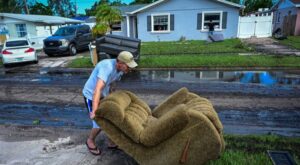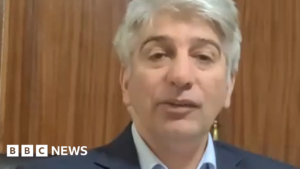‘All of this is to displace people’: Nabatieh reels from Israeli attacks on Lebanon | Lebanon
Hussein Jaber, the head of Nabatieh’s civil defence station, picked his way through a mess of shattered concrete and twisted metal piled knee high, surveying what was left of the city’s Ottoman open-air market, built in 1910 and destroyed by Israeli airstrikes last Saturday.
“When we were kids, everyone would come here to buy their things. This market wasn’t just for Nabatieh, but for all the villages around,” said Jaber, 30, gesturing at the ruined promenade, still smoking five days later.
Children’s clothes, computer parts and products from the now-levelled stores that used to line the market littered the ground, all covered in a layer of grey ash.
Also hidden among the rubble was a fragment of the US-made munition that destroyed the marketplace. The tail fin of a joint direct attack munition (Jdam) – the guidance kit which turns dumb bombs ranging from 500-2,000lbs (230-910kg) into GPS-guided bombs – was found by the Guardian and verified by the crisis, conflict and arms division of Human Rights Watch. A week earlier, another US munition was found at the site of an Israeli airstrike that killed 22 people in central Beirut.
Similar scenes of destruction were repeated across Nabatieh, the second most populated city in south Lebanon, now eerily silent and devoid of life after a week of punishing airstrikes.
Medical officials still left in the city said the wave of Israeli airstrikes had further degraded living conditions, in effect depopulating the city almost entirely. The UN said a quarter of Lebanon’s territory was under evacuation orders by Israel. Amnesty International said the evacuation orders raise questions around whether the orders are intended to create mass displacement.
Medical workers in Nabatieh said the strikes on Wednesday offered evidence of Israel’s intention to provoke displacement. The strikes hit the city’s municipal headquarters and killed members of the city’s crisis cell – including the mayor, Ahmad Kahil, as they were distributing aid. The attacks also hit a building 100 metres (330ft) from the civil defence station, killing Naji Fahs, who had worked as a first responder for 22 years. In total, 16 people were killed and 52 wounded in the day’s strikes.
Israel said its strikes on Nabatieh were targeting Hezbollah installations. Fighting started after Hezbollah fired rockets at Israel on 8 October last year “in solidarity” with Hamas’s attack the day before, but has escalated dramatically since 23 September, when Israel announced a renewed offensive against the group.
Israel’s military issued an evacuation order for the city on 3 October, as it has done with more than 70 villages across south Lebanon, but some people stayed, already having been displaced by fighting along the Israel-Lebanon border. After this week’s airstrikes, almost everyone left, leaving only medical workers and elderly people with reduced mobility.
At Nabih Berri government university hospital, medical staff live on the premises with their families so that they can continue to serve the few city residents that remain. The hospital sits on a hill overlooking the city and its surroundings. Paramedics were stationed on the hilltop, where they sat smoking shisha and scanning the horizon.
A distant thump and a wave of pressure announced a fresh airstrike on Thursday afternoon. A plume of smoke rose on a distant hill. “Yohmor,” one of the men said, identifying by sight the village that was struck, about six miles away from the hospital. Immediately, an ambulance rushed off to check for survivors.
“There is a huge amount of pressure on us. Of course, we try to remove our feelings when we are working,” said Dr Hassan Wazni, the head of Nabih Berri. “But when you see someone who has lost his arm, shoulder-down, or your see a child who …” He trailed off.
The hospital was suddenly overwhelmed with wounded people on Wednesday. “There were horrible sounds of airstrikes and then the ambulances started coming one after another, we couldn’t believe this number of people could come in at once,” Wazni said.
The hospital has started to ration electricity, turning off power in nonessential units, after a power line leading to the hospital was cut by an airstrike. Electricity comes from a diesel-fed generator, but deliveries are few and far between. Drivers of fuel trucks take a great risk by travelling the road leading to Nabatieh, which is occasionally struck by Israeli aircraft. Basic supplies for the people remaining in the city are also threatened, as deliveries of food no longer come regularly.
A delivery of 5,000 litres of diesel on Wednesday meant the hospital had enough to last another five days. Though the threat of running out of fuel, electricity and water worries the director, the hospital is well stocked with medicine and other supplies.
Some time later, the ambulance returned from Yohmor, carrying a husband and wife injured by the airstrike. The man was taken to the emergency department, moaning in pain as doctors worked on him.
The man’s shoulder blade was broken and his lung punctured by shrapnel, a doctor said. The man lay on the operating table, covered in the same grey ash that covered the rest of Nabatieh, while surgeons inserted a tube into the shrapnel hole to suck out the blood which filled the cavity.
“I was here in the 2006 [war] and this is 10 times worse, it’s a brutal war. But we can’t leave the hospital, what can I say?” said Mukhtar Mroue, a general surgeon in the hospital, flexing his biceps in a show of bravado, blood staining his gloves.
Mroue had received a call from a Danish number a few days earlier from a man speaking broken Arabic, telling him and his family to evacuate, similar to calls that Israel has made to residents living near areas that were soon to be bombed. Mroue decided to stay in Nabatieh regardless.
At the town hall that had been bombed a day earlier, bags of lentils, cans of tomatoes and bread spilled out of a burned-out car that had been loaded up by municipal employees before Israel struck the building.
An administrator who was present at the time of the airstrike, Abbas Suloum, stood in front of the rubble holding lumps of flesh, covered in black dirt. It was unclear whose body they came from or even to which part of the body they belonged. Suloum said he had been finding little pieces of human flesh among the debris for the past day and that he was taking them to a nearby hospital for DNA testing.
“This [building] belongs to the state and is meant to serve people, there are no rockets, weapons or ammunition here. We have bread, canned goods here. All of this is to displace people, but we are steadfast,” Suloum said.
Earlier on Thursday, members of Nabatieh’s civil defence gathered to accompany Fahs’s coffin back to his village. Outside the civil defence station where he died, his blood had stained the earth, the dark red pooling in a puddle formed by a leaking firetruck.
“He was never scared of anything, he would always beat us [to the site], we’re younger than him, but he would always beat us there,” Jaber said, tearing up.
More than 115 healthcare workers and emergency responders have been killed by Israel since October last year – most of whom were killed over the last month.
“He was carrying a message, and we want to finish that message. This is our biggest motivation, to keep going standing next to our people and finish our mission as civil defence,” Jaber said.
#displace #people #Nabatieh #reels #Israeli #attacks #Lebanon #Lebanon





